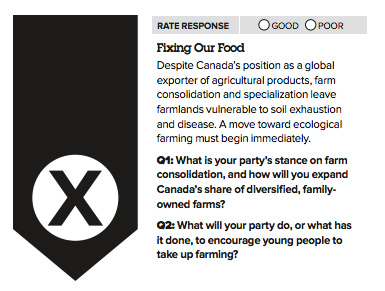
It’s election year in Canada! Get ready for media ads, plastic lawn signs, telephone polls and door knockers! But before those party activists appear on your front step, you should know what you want to ask. Remember to be concise and direct – and don’t let them get away with platitudes. Here are some key environmental questions to ask any politician who wants your vote. Help inform your candidate and keep track of who’s on top of the issues.
Download a shareable, printable PDF of these questions here.
Decarbonizing Canada
Prime Minister Harper has previously rejected the idea of pooling revenue from oil extraction into a wealth fund to pay for social and green initiatives. Norway, however, has collected almost one trillion dollars (US) from its own oil wealth.
Q: Where does your party stand on Canada creating a national pool to fund social and environmental programs from oil revenue?
Protecting Species
Canada’s Species at Risk Act has failed threatened species due to poor enforcement, narrow application and poor agency involvement from Environment Canada, Parks Canada and the Department of Fisheries and Oceans. While 486 of 686 known at-risk species have been listed under the Act, a paltry 13 of those have recovery strategies fully drafted.
Q: What will your party do to ensure Canada meets its goals as a signatory to the 2010 Convention on Biological Diversity given that we are woefully behind protecting both marine and terrestrial preserves?
Fixing Our Food
Despite Canada’s position as a global exporter of agricultural products, farm consolidation and specialization leave farmlands vulnerable to soil exhaustion and disease. A move toward ecological farming must begin immediately.
Q1: What is your party’s stance on farm consolidation, and how will you expand Canada’s share of diversified, family-owned farms?
Q2: What will your party do, or what has it done, to encourage young people to take up farming?
Healing Our Forests
Canada’s forests offer ecosystem services for climate change mitigation and species habitat (among countless other services) while forestry for resource extraction is responsible for $19.8-billion in GDP and more than 216,000 jobs.
Q: How will your party strike a balance between protecting the ecological integrity of Canada’s forests (especially the massive boreal forest region) and the need for an economically and environmentally sustainable forestry sector?
Making Cities Sustainable
Eighty per cent of Canadians live in major urban centres, and many of our suburbs are expanding rapidly. This growth puts added pressure on roads, services and adjacent farmland. At the same time, the Federation of Canadian Municipalities claims we need an additional $200-billion to repair existing infrastructure and fund new projects. This gap leaves us vulnerable to everything from aging bridges to extreme weather events.
Q: How will your party ensure that Canada’s cities are resilient and sustainable?
A More Sustainable North
Despite Iqaluit’s ground-breaking sustainability plan, recycling and waste diversion programs in Nunavut’s capital city are dangerously inefficient, leading to smouldering landfill fires and ammonia, heavy metals and other toxins leaching into nearby water sources.
Q: Proper recycling of waste materials affects human and environmental health and is not strictly a municipal matter. How will your party help northern cities like Iqaluit meet and solve their long-standing waste-diversion crisis?
Toward Better Transportation
Canada’s transportation sector is one of our largest greenhouse gas emitters. Congestion, meanwhile, accounts for billions of dollars in lost productivity each year in regions like the Greater Toronto-Hamilton Area.
Q: How is your party helping Canadians make better transportation choices? Are you investing in public transit, better fuel standards for cars made in Canada or cycling infrastructure?
Transforming Energy
As the 10th highest global energy users per capita, Canadians take energy for granted. We do so at our peril, because the majority of our energy comes from unsustainable fossil fuels that have negative impacts on the health of our people and environment.
Q1: How will your party support alternative energy sources to reduce demand for fossil fuels?
Q2: Will your party prioritize energy efficiency by supporting changes to municipal building codes or offering tax incentives for people who complete home-energy retrofits?
Improving Mining Practices
Booms, busts and environmental damage tell the history of mining in Canada, but they don’t have to portend the future. The site-specific and downstream environmental and human health impacts of mining are well known, but recent industry initiatives to make mining more sustainable should be supported and expanded.
Q: Canadian mining companies are slowly recognizing the need to obtain a social and environmental license before they can successfully operate in Canada. How will your party encourage mining companies, especially those operating overseas, to implement better health, safety and environmental practices?
Working Together
Canada’s current environmental challenges require collaborative solutions, which are harder to achieve when governments, non-profit organizations and industry operate independently or in “silos.” This arrangement often results in weak and fragmented policy.
Q: If your party forms the next government, how will you foster greater levels of cooperation on environmental issue among First Nations, industry, non-profits, NGOs, charities and various provincial and municipal governments?
Communicating Openly
Increasingly, Canada’s environmental challenges require an active and engaged science community to help explain complex concepts to the public – and yet federal scientists are finding their voices stifled.
Q: Where does your party stand on allowing public-sector researchers to speak freely?
Managing Shared Resources
The global atmospheric commons is our largest shared resource and one we all need to protect. A combination of management approaches, including those constructed via international agreements like the Kyoto Accord, is the best means for finding ways to work together.
Q1: Does your party want Canada to re-enter the Kyoto Accord and realign its greenhouse gas emissions reductions with the global community?
Q2: In light of recent climate change agreements between the United States and China, does your party believe a price on carbon should be set by the federal government?
Making Sustainable Dreams Reality
Many environmental goals once thought too difficult to implement have now become accepted, even welcomed, aspects of modern life: sorting waste; choosing light rapid transit over driving; and generating power from wind and solar, to name a few.
Q: Looking beyond your party’s platform, what is your pie-in-the-sky environmental or social dream? What environmental policies or practices that now seem impossible should be commonplace by 2040?

Andrew Reeves is the Editor-in-Chief of Alternatives Journal. Overrun, his book about Asian carp in North America, will be published in Spring 2019 by ECW Press. His work has also appeared in the Globe & Mail, Spacing and Corporate Knights. Follow him on Twitter.













